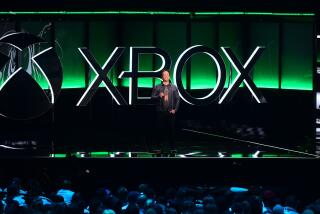Gates Denies Attempting to Weaken Competitors
- Share via
WASHINGTON — Using Microsoft Corp. Chairman Bill Gates’ much-anticipated videotaped testimony in an attempt to undermine his credibility, the government introduced evidence it said shows that Microsoft made deals with Apple Computer Inc. aimed at knocking out competing technologies.
The government introduced several dozen pages of Microsoft e-mails to bolster its claims that the software giant urged Apple to abandon two key Internet software technologies and promote Microsoft’s products instead, especially its Internet Web browser.
Focusing on the role Gates allegedly played in pressuring Apple, the government introduced an 11-page “technology agreement” reached between the two companies in August 1997. Government lawyers contend the pact was reached after Microsoft successfully pressured Apple to promote Microsoft’s Web browser in exchange for Microsoft’s continued development of the Microsoft Office business software for Apple computers.
The Justice Department, 20 states and the District of Columbia have portrayed Microsoft as a corporate predator that illegally used its Windows computer operating system monopoly to extend its software dominance to the Internet and other information technologies.
The government’s presentation Monday touched on a broad array of competing technologies that prosecutors said Microsoft hoped to defeat with Apple’s help.
Justice Department trial lawyer David Boies introduced a memo that suggested Microsoft pressured Apple to drop its support for Java, a computer programming language developed by Sun Microsystems Inc. that is seen as a threat to Microsoft because it can create programs that run on any computer, making Windows less important.
“ ‘How do we wrest control of Java away from Sun,’ ” Boies read from the memo, quoting Gates in an e-mail message to Microsoft executive Ben Slivka on April 14, 1997.
“Is it your testimony that you didn’t raise the question of ‘how we wrest control of Java away from Sun?’ with Mr. Slivka?” asked Boies. Gates responded: “I’ll say again, I doubt I used words like that. But there certainly was an issue of the popularity of our” version of Java versus Sun’s.
Boies also questioned Gates about Apple’s allegations that Microsoft pressured it to cede the red-hot market for Internet multimedia software. Apple executive Avadis Tevanian has submitted 46 written pages of testimony contending Microsoft wanted its media player to become the Internet standard for playing film clips, instead of Apple’s rival QuickTime program.
Finally, Boies introduced several e-mails sent among Gates and his executives suggesting that Microsoft should stop making Microsoft Office for Apple unless Apple promoted Microsoft’s Web browser. The Office program was critical to the survival of the then financially struggling Apple.
“Bill’s top priority is for us to get the browser in the October [operating system] release from Apple,” Microsoft executive John Ludwig wrote in an Aug. 21, 1997, e-mail to fellow Microsoft executive Don Bradford, allegedly recounting a Ludwig meeting with Gates.
“We should do whatever it takes to make this happen. If we are shut out we should escalate to Bill.”
Boies asked Gates if he recalled “conveying to your executive staff in or about August of 1997 that your top priority was to get Microsoft’s browser in the October OS release from Apple?”
Gates responded: “No, I don’t recall that.” Instead, Gates said his primary goal in negotiating the 1997 technology agreement was to resolve a long-standing patent dispute that potentially could have tied up both companies in litigation for years.
Gates is not attending the trial, nor is he expected to be called to testify in person.
More to Read
Inside the business of entertainment
The Wide Shot brings you news, analysis and insights on everything from streaming wars to production — and what it all means for the future.
You may occasionally receive promotional content from the Los Angeles Times.










